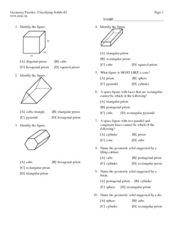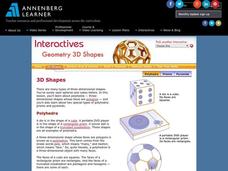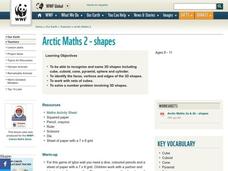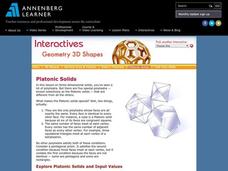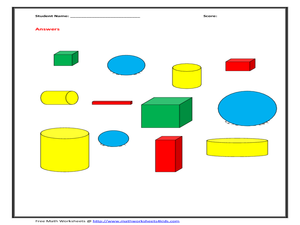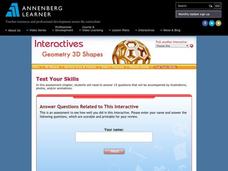Math Worksheets 4 Kids
Sorting 2-D and 3-D Shapes
Challenge mathematicians to examine and sort a variety of 2-D and 3-D figures with a 10-problem solid shapes worksheet.
Mathed Up!
2D and 3D Shapes
What a great assessment to give young mathematicians in order to test their knowledge on two- and three-dimensional shapes. Learners name various shapes, identify the number of edges, faces, and vertices, match an unfolded version of a...
Curated OER
Geometry Practice: Classifying Solids #2
In this solids worksheet, students identify the characteristics of solids. They name solids and determine the number of faces. This three-page worksheet contains seventeen problems. Answers are listed on the last page.
Annenberg Foundation
Geometry 3D Shapes: 3D Shapes
Explore vocabulary related to three-dimensional shapes. An instructional website describes the characteristics of different geometric solids. Learners can use an interactive component to view nets, faces, vertices, and edges of common...
Curated OER
Writing Takes Shape!
Students read The Greedy Triangle and discuss geometric solids. In this geometry lesson, students list the geo-solids in the world and create a graphic organizer to show where geo-solids exist.
SEN Teacher
Nets (3D Models)
Let your learners pick and create a fun shape from this custom template. Shapes range from complex geometric figures to the more common cube and prism. Each page can be labeled with your personal directions. Additional printable listed...
Curated OER
Guess My Shape
Learners play a game with shapes. They work in groups to identify the names and characteristics of various shapes. They give each other clues to see if others can identify the shape being described. This is a great hands on activity.
World Wildlife Fund
Shapes
Investigate the properties of three-dimensional figures with this Arctic-themed math lesson plan. Beginning with a class discussion about different types of solid figures present in the classroom, young mathematicians are then given a...
Curated OER
Castles On The Ground (2D & 3D Shapes)
Explore the relationship between 2D and 3D shapes by having your class view representation of shapes and investigate their symmetry. They will create a solid object from diagrams and describe the reflection or rotational symmetry. In the...
Curated OER
Making and Describing Shapes
Explore the concept of creating and describing 2D and 3D shapes. Using geometry your scholars will describe the attributes of shapes and their properties. They explore and discover what happens when you combine shapes and...
Curated OER
Shape Matching Cards
In this shape matching game worksheet, students cut out the 7 pictured shape cards and the 7 written description cards. Students match the shape cards to the appropriate description cards as they play the memory game.
Curated OER
Classifying Three-Dimensional Shapes
Compare geometric solids based on their properties. Your emergent geometers use spaghetti and marshmallows to build models so they can examine the number of faces, edges, and vertices on polyhedra of their own creation. Resource includes...
Annenberg Foundation
Geometry 3D Shapes: Platonic Solids
From polyhedrons to platonic solids, here is a lesson that will have your classes talking! As an introduction to platonic solids, scholars cut and fold nets to create the three-dimensional solids. They use an interactive component to...
Curated OER
Solids...Volume and Surface Area
In this volume and surface area worksheet, students find the volume and surface area of different solid figures. Students complete 8 problems.
Curated OER
Countdown Challenge: Platonic Solids - Part I
Use a Platonic solids worksheet to record the number of faces, edges, and vertices of five polyhedra whose faces, edges, and vertices are all identical. For each figure, learners write a proof of Euler's formula (F+V=E+2). They create a...
Curated OER
Poly-Mania
This hands-on lesson takes young geometers on a tour of 2D polygons and 3D polyhedrons. After exploring different web resources and discussing geometric shapes, small groups construct models of polyhedrons using bendable straws. Note:...
Curated OER
Recognize the Shapes
In this 3D shapes worksheet, learners color the 3D shapes according to the directions given. Students color 12 3D shapes total.
Annenberg Foundation
Geometry 3D Shapes: Euler's Theorem
How do you get a theorem named after you? Euler knows what it takes! The third lesson of five asks pupils to use an interactive activity to compare the faces, vertices, and edges of seven different three-dimensional solids. They use...
Curated OER
A Cone and Its Net
Create and investigate nets for solid shapes with your class. They identify the different parts and faces of each polygon and solid then calculate the surface area and volume of cones. They use circle sectors of varying sizes to build...
Curated OER
Recognizing Three Dimensional Shapes
In this 3D shape worksheet, students review the names of 4 shapes on page one and color each shape a specific color to match the key on page two.
University of Utah
Geometry Part 2: Measurement in 2- and 3-Dimensions, Plane Sections of Solids
What kind of tree does a math teacher climb? A geometry! Here is a lesson that includes all the geometry resources you could ever wish for in one comprehensive workbook. Class members demonstrate what they have learned by...
Annenberg Foundation
Geometry 3D Shapes: Surface Area and Volume
Whether you wrap it or fill it, you're using geometric concepts. Classmates use an interactive approach to learn how to find volume and surface area of cylinders and prisms in the second lesson in a five-part series. The online lesson...
Annenberg Foundation
Geometry 3D Shapes: Test Your Skills
Time to find out what they've learned! The final lesson of a five-part series has learners complete a 39-question multiple choice review. They use what they've learned in the previous lessons to complete questions that include concepts...
Curated OER
2D and 3D figures
In this 2D and 3D figure worksheet, students name different shapes and decide if they are polygons or not. Students complete 8 problems.




